Increase in threats to school officials, a local phenomenon, has almost trebled post-COVID, studies indicate
The current state of threats and harassment against school board members in the United States is a cause for concern, with incidents becoming increasingly common and characterized by harsh community reactions and instances of threats of physical harm.
One such incident occurred in Gettysburg, Pennsylvania, where a school board member was labelled a "Nazi" over the tennis coach's contract renewal, leading to a "second Civil War" type of battle within the community. Six other current or former school board officials have reported experiencing harassment or threats in similar circumstances.
Similarly, in Florida's Broward County, school board member Sarah Leonardi faced threats after chaperoning an elementary school field trip to a gay-owned bar and grill. Despite this, Leonardi has decided to continue serving on the school board, even as she continues to receive threats when conservative media occasionally republishes the school field trip story.
These incidents are not isolated cases. A study by Princeton University's Bridging Divides Initiative found that threats against local school officials across the U.S. have increased by 170%, with the researchers linking the increase to national attacks on diversity, equity and inclusion initiatives as well as LGBTQ+ policies.
The anger and distrust that developed during the pandemic has contributed to disputes over cultural issues, with ordinary issues, like the construction of a new band hall, also becoming targets of misinformation. False stories on social media, such as claims about children dressing up like cats and having litter boxes in bathrooms, sow confusion and fuel harassment.
The study, which is the largest and most comprehensive of its kind in the country, interviewed 39 school board officials and surveyed over 820 school board officials. The researchers found that members of school boards report that some community factions are aggressively hostile toward public education and its representatives, escalating verbal abuse and threats to unacceptable levels.
Key contributing factors to threats and harassment include political and social controversies, community polarization and selective outrage, broader social issues affecting schools, and legal and policy frameworks. For example, in Alachua County, a school board member faced intense backlash over comments related to a public figure’s death, resulting in community anger and calls for removal from the board. Another board member criticized this reaction as extreme and identified it as part of a broader attempt to use education as a wedge issue.
In response to these threats and harassment, efforts are being made to manage tensions without compromising the safety and integrity of school leadership. This includes legal frameworks, community engagement, and efforts to counter misinformation on social media. The researchers at Princeton University are also monitoring the possibility of harassment driving school board members to leave public service or avoid engaging on controversial topics.
References:
- The Atlantic
- NPR
- Education Week
- EdWeek Market Brief
- Education Dive
- The escalating threats of physical harm and harsh community reactions against school board members in the United States, such as the one in Gettysburg, Pennsylvania, have resulted in a disturbing increase of 170%, according to a study by Princeton University.
- In addition to political and social controversies, community polarization, and selective outrage, the study found that false stories on social media, like claims about children dressing up like cats, also fuel harassment against school board members.
- Despite facing threats and harassment, school board members, like Sarah Leonardi in Florida's Broward County, continue to serve, even as conservative media republishes stories that provoke such responses.
- To address these threats and harassment, it is essential to implement legal frameworks, engage the community, counter misinformation on social media, and monitor the possible impact of harassment on school board members leaving public service or avoiding controversial topics.




